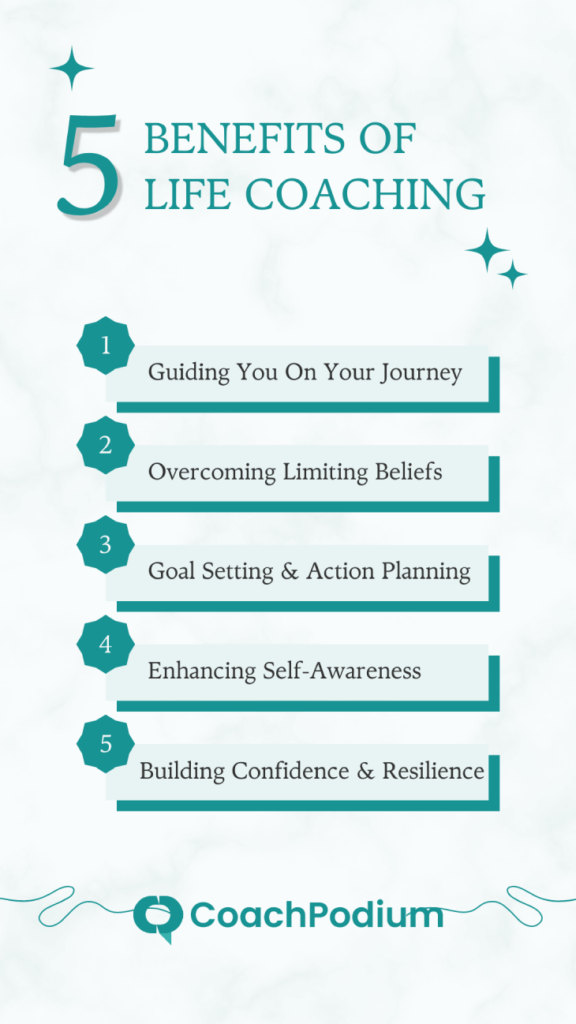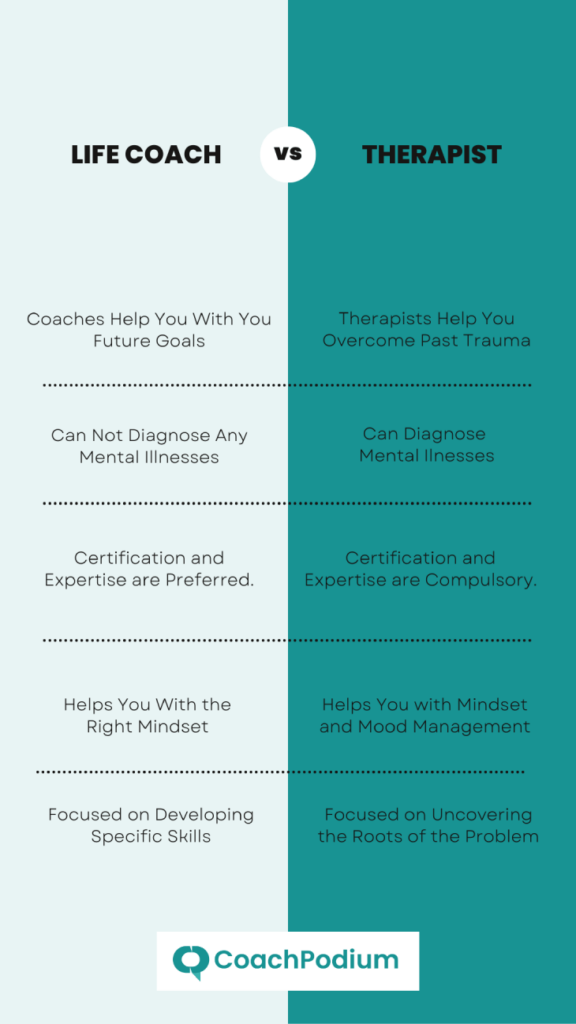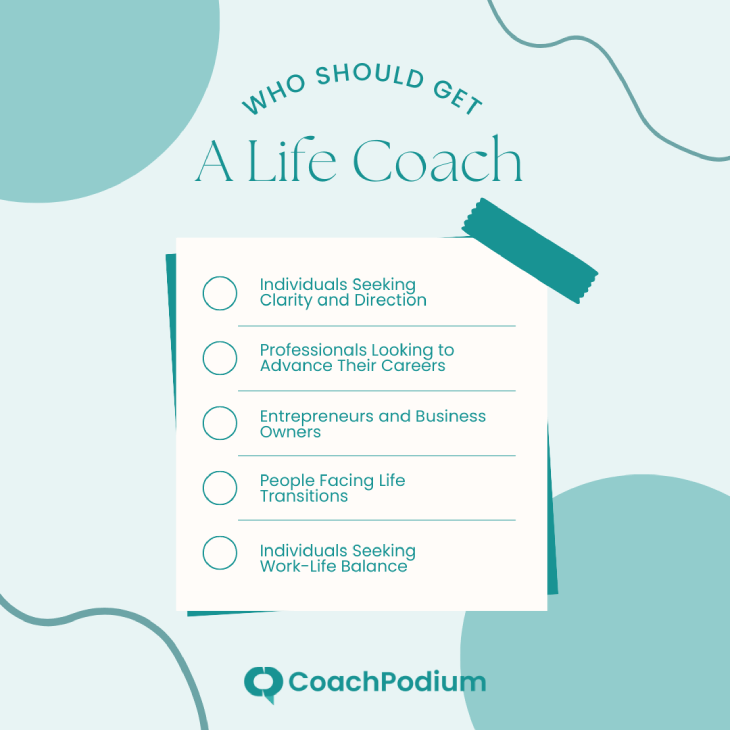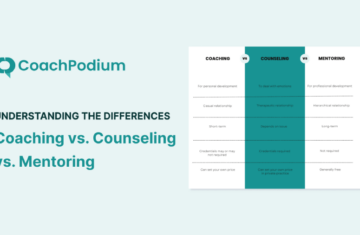Have you ever been stuck in life, trying to figure out what to do or how to accomplish what you want to accomplish? If so, you are not by yourself. Many people experience this and long for direction and assistance as they face obstacles in life.
A life coach can save the day in this situation!
Hiring life coaches to enhance personal and professional lives is very popular nowadays. But exactly what is a life coach?
Let’s dig in deeper to understand the concept of a life coach.
What is a Life Coach?
Having a life coach is like having your mentor, strategist, and cheerleader rolled into one amazing package. But here comes the question, “What is a life coach?”
They are the ones you turn to when you feel lost in life’s maze, unaware of what direction to go in or how to attain your full potential.
Imagine having someone genuinely committed to supporting you as you overcome difficulties and pursue your goals. That person is a life coach with the skills and resources to direct you toward your objectives.
A life coach guides you in identifying the barriers you have placed in your way and replacing them with more empowering ideas. They challenge your thinking, offer novel viewpoints, and assist you in reshaping your perspective, enabling you to reach your most significant potential.
A life coach is a trusted companion in your quest for personal development. They acknowledge your accomplishments, encourage you to keep your promises, and offer steadfast support when facing obstacles. With their help, you may overcome challenges, make essential objectives, and design a life that fulfills your aspirations.
Explore our guide on the Best Online Coaching Platforms and elevate your coaching practice today!
The Power Of a Life Coach: What Does a Life Coach Offer?

Guiding You On Your Journey
Sometimes, there are no obvious signposts along life’s twisting path. Your guide in identifying your genuine passions, values, and purpose is a life coach. They help you recognize your assets and limitations so that you may make decisions and activities that are in line with your objectives.
Overcoming Limiting Beliefs
We all need help with nagging doubts and limiting ideas that prevent us from achieving our goals. Your self-imposed barriers are challenged and removed with the aid of a life coach. They give you the power to swap out unhelpful thought patterns for empowering ones by asking the right questions and reframing the situation.
Goal Setting and Action Planning
Goal-setting is one thing, but achieving them calls for a strategic plan. A life coach helps you define your goals, turn them into actionable tasks, and develop action plans. They hold you responsible for your actions, ensuring that you stay on course and make steady progress toward your objectives.
Enhancing Self-Awareness
Self-awareness is essential for developing personally. You can better understand who you are, your strengths, and where you can create by working with a life coach. They help you make deliberate decisions and form new habits that align with your goals by shedding light on blind spots and behavioral tendencies.
Building Confidence and Resilience
Success in any effort depends on having confidence. A life coach offers the motivation and assistance to develop resilience and self-assurance. They encourage you to keep moving forward by acknowledging your accomplishments, no matter how modest, and helping you recover from disappointments.
Are Life Coaches and Therapists the Same?
Two professions frequently emerge when seeking advice and assistance for personal development and well-being: life coaches and therapists. Although both experts are crucial in assisting people in overcoming obstacles in life, it’s essential to recognize their differences.
Let’s explore the worlds of life coaches and therapists and discover the distinctive features of each career.

The Focus
The areas of focus that each of these professionals has are one of the key differences between them. Therapists primarily assist those struggling with psychiatric disorders, emotional trauma, or mental health problems. Deeply ingrained psychological issues are addressed and resolved by diagnosis, therapy, and support provided by them.
Life coaches, on the other hand, concentrate on personal development, goal-setting, and self-improvement. They work with people who are typically in good mental health and seek advice in particular areas of their lives. Life coaches empower clients to recognize their assets, create worthwhile goals, and take action to realize them. They offer clients assistance, accountability, and techniques to help them reach their greatest potential.
The Approach
To identify and treat psychological problems, therapists frequently employ a therapeutic approach that entails probing one’s prior experiences, emotions, and underlying patterns. In addition, they could use different therapeutic approaches to promote healing and personal transformation, including cognitive-behavioral therapy, psychoanalysis, or interpersonal therapy.
Life coaches, on the other hand, adopt a more proactive and forward-looking approach. They assist clients in defining their objectives, identifying their present issues, and creating workable methods to get over roadblocks and advance. In addition, life coaches frequently use tools to encourage development and achievement, including goal-setting exercises, action plans, and accountability frameworks.
Qualifications and Credentials
Typically, therapists have advanced degrees in social work, psychology, or counseling. To become licensed practitioners, they go through substantial education, training, and supervised clinical experience. It enables them to deliver therapy safely and morally while diagnosing and treating mental health conditions.
Although life coaching is expanding quickly, most nations have yet to define rules or licensing criteria. However, many legitimate coaching organizations offer training and certification programs for professional life coaches. These certificates guarantee that coaches have the abilities and expertise to help their clients efficiently.
Collaboration and Referrals
Life coaches and therapists might sometimes work together to offer people all-encompassing help. For example, a therapist and life coach may collaborate to meet a client’s specific needs juggling psychiatric problems and personal development objectives. Once the treatment is over, therapists may suggest clients engage with life coaches to concentrate on goal-setting and action planning.
Understanding that a life coach and a therapist play different but complementary responsibilities is critical. While life coaches excel at inspiring people to attain their objectives, maximize their potential, and create a satisfying life, therapists are great resources for mental health issues.
In conclusion, while life coaches and therapists provide direction and support, their roles are distinct. While life coaches specialize in personal growth, goal success, and self-improvement, therapists concentrate on diagnosing and treating mental health problems. Knowing the differences between the two professions enables people to make educated decisions based on their needs and goals, ensuring they get the proper support to succeed in their journeys of growth and well-being.
Who Should Get a Life Coach?
Occasionally, we need direction and support to traverse life’s intricate and complex road. A life coach can save the day in this situation!
But who exactly ought to think about hiring a life coach? The fact is that working with a life coach can be beneficial for anyone who wants to advance their personal growth, accomplish their objectives, and lead a more fulfilling life. So, let’s look at the different types of people who can benefit from working with a life coach.

Individuals Seeking Clarity and Direction
A life coach can offer vital advice if you find yourself at a crossroads in your life and need clarification on your purpose or the direction you should go in. They aid you in developing meaningful goals and a plan of action by supporting you in being more aware of your values, passions, and aspirations.
Professionals Looking to Advance Their Careers
A life coach can be a great ally in your quest for professional development, whether you’re just starting your job or want to get promoted. They can assist you in recognizing your assets, overcoming self-doubt, and acquiring the abilities required to succeed in your chosen profession.
A life coach may also help you with career transition plans, interview prep, and resume creation, enabling you to advance professionally.
Entrepreneurs and Business Owners
It may be both thrilling and overwhelming to run a business. A life coach can offer insightful advice and practical tactics to assist business owners and entrepreneurs overcome obstacles.
A life coach can be a trusted counselor, assisting you in remaining motivated, focused, and responsible for your success. They can help you create and accomplish business goals and enhance your time management and decision-making abilities.
Individuals Struggling with Confidence and Self-Esteem
Low self-esteem and self-confidence can impede personal development and keep people from realizing their full potential. A life coach can assist you in recognizing and challenging self-limiting thoughts, swapping them out for empowering ones and fostering self-acceptance and self-compassion. You can develop confidence, embrace your strengths, and cultivate a positive mentality with the help of a life coach.
People Facing Life Transitions
Whether it’s beginning a new chapter, changing careers, or navigating a significant life event, life is full of transitions. Having a life coach by your side during these trying times can offer stability, support, and direction. In addition, they can assist you in navigating emotional difficulties, establishing fresh objectives, and formulating plans for thriving in your new conditions.
Individuals Seeking Work-Life Balance
Finding work-life balance can be a daily struggle in our fast-paced and demanding society. However, you may set boundaries, choose your priorities, and develop time management plans with the assistance of a life coach. They help you balance your personal and professional lives, lower stress, and enhance your well-being.
Types of Life Coaches
Now that you know what a life coach is and who needs them, let’s discover the types of life coaches.
Career Coaches
Career coaches concentrate on helping people find meaningful occupations, navigate career transitions, and succeed in their professional endeavors. They offer advice on topics like creating a resume, employing job search tactics, getting ready for interviews, and career planning.
Personal Development Coaches
Individuals can improve their self-awareness, increase their confidence, and learn skills for personal development with personal development coaches. They assist clients in developing and reaching personal objectives, enhancing interpersonal connections, controlling stress, and enhancing general well-being.
Health and Wellness Coaches
Individuals who want to enhance their physical and emotional well-being can work with health and wellness coaches. They offer advice on diet, exercise, handling stress, losing weight, and leading a balanced and healthy lifestyle.
Relationship Coaches
Relationship coaches work with individuals and couples to strengthen their bonds and increase intimacy, communication, and overall happiness. In addition, they provide direction for resolving disputes, fortifying bonds, and developing wholesome relationships.
Financial Coaches
Financial coaching assists clients with budgeting, debt management, financial stability, and intelligent money management. In addition, they offer tips for investing, saving, and reaching long-term financial objectives.
Leadership Coaches
Professionals in leadership roles can improve their leadership abilities, build practical communication skills, and make plans for inspiring and motivating their colleagues by working with leadership coaches. They assist people in developing their leadership potential to the fullest.
Parenting Coaches
Parents who work with parenting coaches receive advice and assistance as they negotiate the difficulties of raising children. In addition, they offer methods for encouraging good parent-child interactions, effective communication, and discipline.
Executive Coaches
Executive coaches help senior leaders and executives improve their strategic thinking, decision-making, and leadership capabilities. They assist people in succeeding in their careers and enhancing group performance.
Finding the Right Life Coach
With life coaching becoming increasingly popular, selecting a coach that connects with you and comprehends your specific requirements is crucial. Here are some pointers to assist you in finding the ideal fit:
Research and Reviews
Make sure to read evaluations of possible coaches and conduct thorough research. Reading customer testimonials is mandatory to learn more about a coach’s coaching approach and efficacy.
Compatibility
You can pick a coach with whom you are at ease speaking candidly. Since the foundation of the coaching relationship is trust, choosing a partner who shares your beliefs and ambitions is critical.
Specializations
It would be best if you thought about hiring coaches with expertise in areas related to your objectives. Finding someone with knowledge in your desired field can significantly improve your situation, whether it’s for personal growth, job coaching, or relationship coaching.
Consultation Calls
Before deciding to get into a coaching partnership, most coaches give consultation calls to get to know one another. You can use these calls to discuss your needs, ask questions, and determine whether their teaching approach matches your expectations.
Ready to Take Your Coaching to the Next Level? Try CoachPodium free for 30 days!
Conclusion
As a whole, embarking on a journey to explore oneself with the help of life coaches can be rewarding in many aspects. For that, you should be well aware of what a life coach is. Their expertise can provide direction, encouragement, and responsibility when trying to improve your life’s quality.
Hence, if you are in search of someone who can help you recognize your talents, know your goals, and achieve the desired outcomes, hiring a qualified life coach will be great. They offer helpful tools, approaches, and insights to handle difficulties, overcome barriers, and realize one’s full potential.
Life coaching has its limitations and is not a substitute for therapy. Still, it may be a transformative experience for those willing to engage in their personal development and build a fulfilling life. Whether searching for clarity, professional success, enhanced relationships, or a balanced lifestyle, a life coach could be a trustworthy travel companion.



